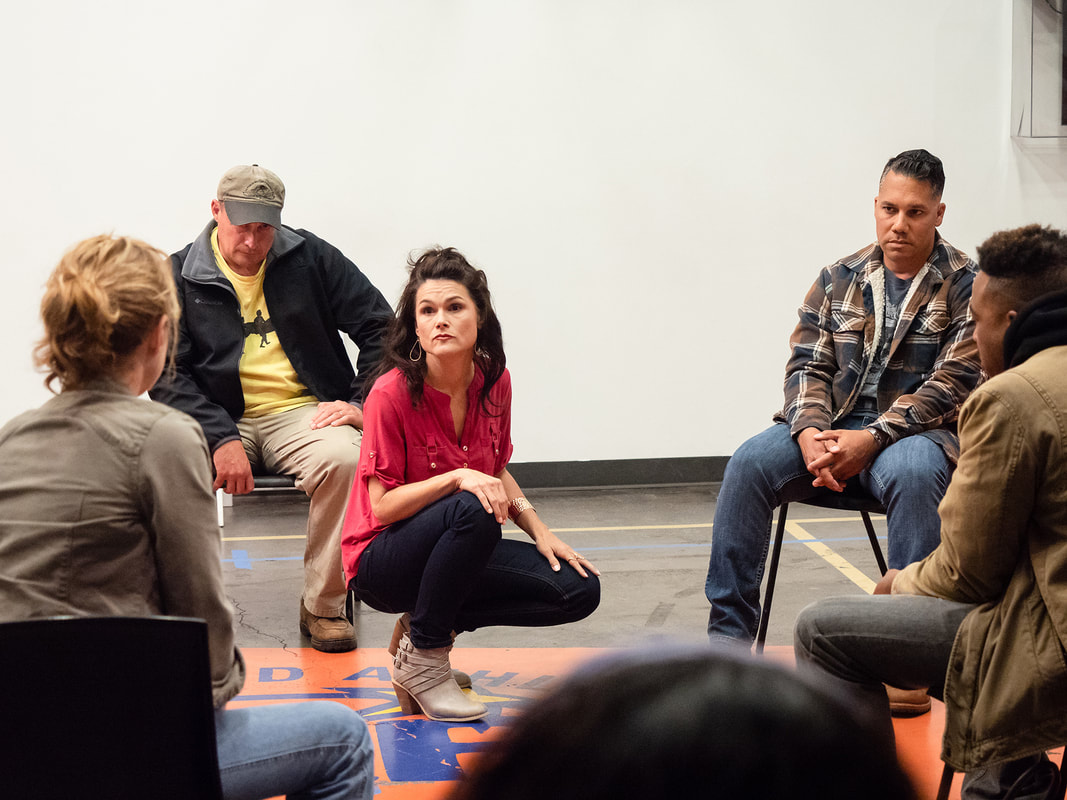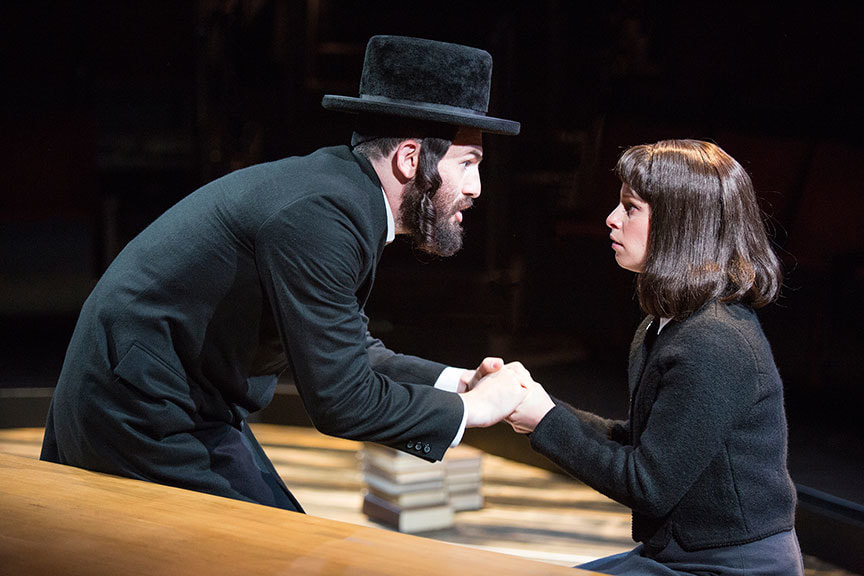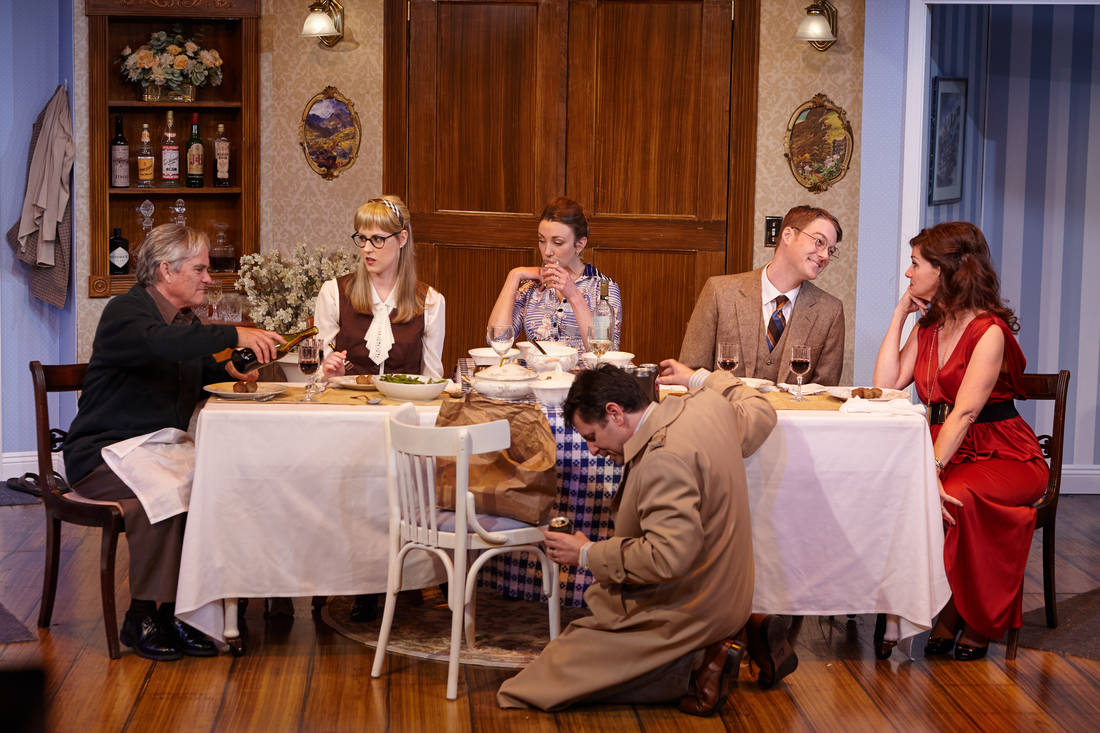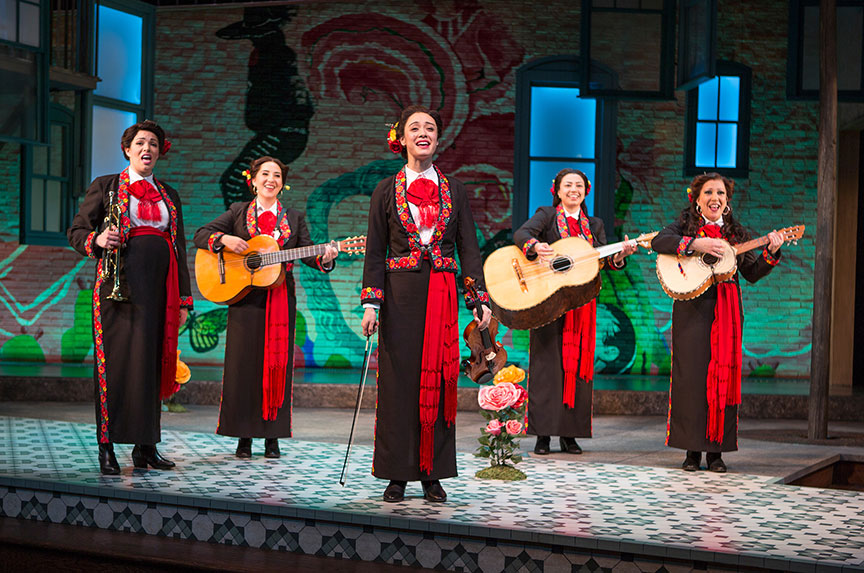|
Hannah Logan (center) portrays a drama therapy teacher in "What Happens Next." What happens next for a circle of military veterans is discovering a means to cope with the scars of war and discovering themselves at the same time. This psychological and emotional dynamic underlies Naomi Iizuka’s penetrating What Happens Next, being presented by La Jolla Playhouse in association with L.A.-based Cornerstone Theatre Company. The site-specific work is part of the Playhouse’s “Without Walls” program and is staged at the Challenged Athletes Foundation in Mira Mesa. Hannah Logan plays the facilitator of a small drama therapy group; her students are a mixture of actors and actual vets. What Happens Next is potent and very, very real. It’s also a must-see. (Review originally published in San Diego CityBeat on 4/25/18.)
0 Comments
Dave Klasko and Ali Rose Dachis in "The Wanderers." Photo by Jim Cox The dual worlds of Anna Ziegler’s The Wanderers do not physically collide, but they are remarkably intertwined in this smart world-premiere play directed by Barry Edelstein in the Old Globe’s White Theatre. One world is that of cerebral but detached Brooklynites Abe (Daniel Eric Gold) and Sophie (Michelle Beck). They’re both writers of the naturally tortured variety, though the successful Abe is also pretentious and in love with his every word, especially those he speaks in fits of narcissistic disillusionment. The other world is seen 20 years earlier. Its inhabitants are Abe’s father Schmuli, an ultra-Orthodox Jew in the Satmar Hassidic community, and mother Esther (Ali Rose Dachis, the cream of the cast), whose joyous spirit and freedom are oppressed by the arranged marriage.
When Abe begins an email relationship with Julia Cheever (Janie Brookshire), a beautiful devotee from one of his book readings, another layer of dysfunction is added to his deteriorating relationship with Sophie. Meanwhile, the parallel scenario from the past both heightens and explains the pain and guilt that drive Abe to sabotage all that is good in his turbulent life. Ziegler’s characters have just enough serrated edges to stave off what could otherwise be First World wallowing. The depth of her script, with its multiple reflections on faith and self, ensures 100 minutes of thoughtful and riveting theater. (Review originally published in San Diego CityBeat on 4/25/18.) The cast of "How the Other Half Loves" at North Coast Repertory Theatre. Photo by Aaron Rumley Very much a product of its time and place, the swingin’ England of 1969, Sir Alan Ayckbourn’s comedy “How the Other Half Loves” skirts the edges of issues such as sexual politics and distinctions between the classes. But its principal observation is this: Adultery is not only a response to the era’s sexual freedom but, if deftly indulged in and concealed, sophisticated enough to transcend class differences. A casual affair can be bloody good fun for all … well, perhaps not for the cuckolded spouses, but there can be bloody good fun in forgiveness, too.
As such, “How the Other Half Loves,” onstage at North Coast Repertory Theatre in Solana Beach, feels dated, especially when today’s headlines suggest that blithely engaged in infidelity is no laughing matter. But uneasy as its premise may be, the play’s comic antics are frequently on the mark. That’s an achievement indeed for a production two and a half hours in length. Upper-class Frank Foster (James Newcomb, a manifestation of old-guard British sputter) has no clue that his flamboyant wife Fiona (Jacquelyn Ritz) is carrying on with one of Foster’s employees. That would be Bob Phillips (Christopher M. Williams), a bit of a boor who shares an untidy and antagonistic household with wife Teresa (Sharon Rietkerk, razor sharp), who has nearly stopped giving a damn. Their unseen baby is an appendage, practically a bother. When faced with having to alibi to their spouses, Fiona and Bob, unbeknown to each other, involve a young couple, William and Mary Featherstone (Benjamin Cole and Noelle Marion). The Featherstones are as unhip as unhip can be. Fiona claims to have been out late consoling a cheated-on Mary, and Bob a cheated-on William. The visual payoff comes in “How the Other Half Love’s” cleverest and most inventive sequence: a dinner party at which the Fosters host the Featherstones, and a dinner party the next evening at which the Phillipses host the Featherstones. The two dinners are staged simultaneously, at one table, with the characters in one scenario oblivious to those in another, and the Featherstones fast and furiously switching from one moment in time to the other. The ingenuity of two separate narratives unfolding at the same time on one set (designed by Marty Burnett) is the attraction of “How the Other Half Loves” and what elevates it above a retro episode of TV’s “Love, American Style” (make that “Love, British Style”). The focused cast directed by Geoffrey Sherman brings this off illusion seamlessly. Inevitable misunderstandings and a dollop of slapstick arrive in the play’s second act. The good news is that doddering Frank and meek little Mary come to life when needed most. The scene-stealer in North Coast Rep’s “The Last of the Red Hot Lovers” last fall, Noelle Marion is terrific here, too, in a polar-opposite part. “How the Other Half Loves” is heavy on Beatles tunes and is oh-so-‘60s in its sensibilities, but its hard-working ensemble is fab. (Review originally published in the San Diego Union-Tribune on 4/17/18). The Brits have an uncanny knack for creating comedy laden with slapstick physicality and shameless sexual innuendo. What’s more, American theatergoers can’t seem to get enough of it. Michael Frayn’s madcap farce Noises Off is proof-positive: it’s 36 years old and still going strong on both professional and community theater stages. A revival was even running on Broadway as recently as two years ago.
So how can Coronado’s Lamb’s Players Theatre go wrong with its own production of Noises Off? Answer: It doesn’t. The combination of Robert Smyth’s direction and Jordan Miller’s choreography (not of dancing but of breathless climbing and descending of stairs, and impeccably timed slamming of doors) guarantees a giddily frantic pace and an exhausting onslaught of sight gags – absolute musts for Noises Off. Smyth and Miller have an indefatigable cast (stylishly costumed by Jeanne Reith) to work with, too: Deborah Gilmour Smyth, Brian Mackey, Charlene Wilkinson, Fran Gercke, Ross Hellwig, Jessica John, Cynthia Gerber, Jim Chovik and Omri Schein (the latter, alas, under-used here). The actors are having so much fun not taking any of this seriously that the audience can’t help but go along. Noises Off concerns the staging in the 1970s of an English touring show by playwright “Robin Housemonger” provocatively titled Nothing On. Act One of Noises Off is weakened by a lot of arguably extraneous exposition and establishment of character. But Act Two, in which the “stage” is turned around and the Lamb’s audience sees the characters from a backstage perspective, is fast, furious and riotous. (Credit goes to scenic designer Mike Buckley and to the Lamb’s crew that moves things around during intermissions.) In Act Three, Nothing On comes all undone and silliness prevails. Along the way, Mackey tumbles down stairs. Hellwig and Chovik lose their trousers. Gilmour Smyth sits in sardines. Wilkinson loses contact lenses and stares numbly into space. Gercke (as the show’s reluctant director) gesticulates as though guiding planes from runway to gate. There’s a total absence of tension or pretense, which accounts in part for Noises Off’s enduring charm and popularity. (Review originally published in San Diego CityBeat on 4/18/18.) Men on Boats has to be the most exhausting show of the year to date. Not for audiences, which should be entertained by New Village Arts Theatre’s white-knuckle dramatization of an epic journey through churning waters into the Grand Canyon. But Men on Boats’ 10 actors, all of them women portraying men, tirelessly create the illusion of these adventurers challenging the wrath of the Green and Colorado rivers by miming rowing, by grunting, by shouting and flailing. The perspiration onstage is real.
Jaclyn Backhaus’ play, directed at NVA by Melissa Coleman-Reed, follows the 1869 quest of an intrepid four-boat crew led by one-armed explorer John Wesley Powell. The U.S. government-funded mission: to make the first successful passage by men of European descent through the treacherous waters of the Grand Canyon. Men on Boats chronicles this dangerous trip and does so with the device of an all-woman cast, including NVA Artistic Director Kristianne Kurner as Powell. With nothing more than projections (by Melanie Chen Cole) of the rivers’ furious white water and towering red rocks (designed by Christopher Scott Murillo) behind them, Kurner and company ably achieve the impression of an adventure that would seem extremely difficult to suggest on a theater stage. It helps that the actors are in nearly perpetual motion and in a consistent state of full-throated excitement. As for the gender switch, it doesn’t on its face add any layering of understanding to the story, though the physicality of the actors demonstrates that no battle with nature is the province of one sex. The steady Kurner is Men on Boats’ anchor; among the ensemble the most nuanced performance is delivered by Nancy Ross in the role of William H. Dunn, who recognizes the peril of the exploit, challenges Powell’s judgment and even comes close to crumbling. Men on Boats is better at spectacle and ingenuity than it is at being a play. Its episodes are drawn out, its humor sometimes strained and its ending clunky, unsatisfying. There must be, however, only admiration for its director, who must navigate a cinematic story on a theater stage, and for the 10 women who give their all in a fashion that would have made Powell’s crew proud. (Review originally published in San Diego CityBeat on 4/11/18.) Jennifer Paredes (center) stars in "American Mariachi" at the Old Globe Theatre. Photo by Jim Cox American Mariachi is extremely sentimental, but Jose Cruz Gonzalez’s new play has its heart in the right place: wrapped around a musical art form that is deeply engrained in Mexico’s history, culture and its people. The mariachi performances onstage in this world premiere at the Old Globe, presented in association with Denver Center for the Performing Arts Theatre Company and directed by James Vasquez, are by turns rousing and romantic. They will bring to mind times merry and perhaps bittersweet. As is stated with simple eloquence during the one-act show, “Music is memory.”
Memory is key to the 1970s story, in which the loving and dauntless Lucha (Jennifer Paredes) sets out to form an all-woman mariachi group, not just to break barriers but to be able to perform for her Alzheimer’s-afflicted mother (Doreen Montalvo) a song from her elusive past. Lucha’s neophyte mariachi recruits are familiar character types, but each is engaging in her own way, and all, including Paredes, actually do perform by play’s end. (A five-man mariachi group does so throughout.) With its music and gorgeous costumes, American Mariachi (not sure why it’s called that) is beautiful to hear and see even if it does pull with persistence at the heartstrings. (Review originally published in San Diego CityBeat on 4/4/18.) Props to San Diego Repertory Theatre for serving up something decidedly different: a fully interactive production titled Beachtown, in which audience members are more like attendees at a community council meeting than theatergoers. In this immersive conception by Herbert Siguenza and Rachel Grossman, “Beachtown” is a veiled name for San Diego, and the occasion of the meeting is the “100th Anniversary Time Capsule Day Ceremony.” Actors portraying Beachtown officials facilitate audience debate and voting of what should go into – and not go into – a commemorative time capsule.
Some of this is fun to be part of – like the spontaneous sing-along about the tuna industry of all things – but Beachtown never truly seems like theater. It’s a long game of participatory pretend. There should be more giddiness and less audience speechifying and tiresome counting of votes. (Review originally published in San Diego CityBeat on 4/4/18.) |
AuthorDavid L. Coddon is a Southern California theater critic. Archives
July 2024
Categories |
David Coddon |
|



